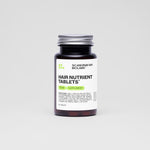Biotin, also known as vitamin B7, is a popular supplement often touted for its potential benefits for hair, skin, and nail health. While biotin is generally considered safe when taken at recommended dosages, it's important to be aware of its potential downsides and risks, especially when consumed in excess.
Table of content
What is the downside of taking biotin?
The primary downside of taking biotin, particularly at high doses, is the potential for adverse side effects and interactions with certain medications or medical conditions. Additionally, there are concerns about the efficacy of biotin supplements for promoting hair growth or improving hair health.
Potential side effects
While biotin is a water-soluble vitamin, excessive intake can lead to the following side effects:
- Digestive issues: High doses of biotin may cause nausea, cramping, and diarrhea in some individuals.
- Skin rashes: Some people may experience acne, rashes, or other skin reactions after taking biotin supplements.
- Insulin resistance: There is some evidence that high biotin intake may increase insulin resistance, potentially affecting blood sugar control in individuals with diabetes or prediabetes.
Interactions with medications and laboratory tests
Biotin can interfere with certain laboratory tests, leading to inaccurate results. This is particularly concerning for individuals undergoing tests for conditions such as thyroid disorders, cardiovascular disease, or cancer. If you are scheduled for medical tests, it is recommended to discontinue biotin supplements temporarily to avoid skewed results.
Additionally, biotin may interact with certain medications, including anticonvulsants, antibiotics, and cholesterol-lowering drugs, potentially affecting their efficacy or increasing the risk of side effects.
Lack of scientific evidence for hair growth claims
While biotin is often marketed as a hair growth supplement, the scientific evidence supporting its efficacy for promoting hair growth or preventing hair loss is limited and inconsistent. Most studies have been small-scale or anecdotal, and larger, well-designed clinical trials are needed to validate these claims.
It's important to note that biotin deficiency is relatively rare, and most individuals can obtain adequate amounts of biotin from a balanced diet rich in foods like eggs, nuts, legumes, and whole grains.
As your leading source for hair health information over the past 4 years, we never compromise on accuracy. When it comes to your health, you deserve information you can truly rely on - and earning your trust is our top priority.
Here's how Scandinavian Biolabs ensures every piece of content meets the highest standards of accuracy and integrity:
- Credentialed Experts: Our reviewers are actively practicing doctors and medical researchers
- Stringent Reviews: Content undergoes rigorous editing by subject specialists and review by a practicing doctor.
- Evidence-Based: We rely on well-established research from trusted scientific sources like peer-reviewed journals and health authorities.
- Full Transparency: Our editorial standards, writer credentials, reviewer credentials, correction process, and funding are all publicly documented.
- Independent Voice: While we do promote products, we operate in a vacuum to business operations. Our main goal is just an unwavering commitment to providing medically-sound guidance.
You can count on Scandinavian Biolabs to consistently deliver the trustworthy health information you deserve. Read our Editorial Standards.
Considerations and precautions
If you are considering taking biotin supplements, it's essential to consult with a healthcare professional, especially if you have any underlying medical conditions or are taking medications. They can help determine if biotin supplementation is appropriate for you and recommend the appropriate dosage.
Additionally, it's crucial to prioritize a balanced diet and address any potential nutrient deficiencies or underlying health concerns that may contribute to hair or skin issues, rather than relying solely on biotin supplements.
Alternative approaches to support hair health
Instead of relying solely on biotin supplements, consider the following alternative approaches to support overall hair health:
- Balanced diet: Consume a varied diet rich in proteins, vitamins (such as vitamins C, D, and zinc), and healthy fats to provide essential nutrients for hair growth.
- Stress management: Chronic stress can contribute to hair loss and impair hair health. Incorporate stress-reducing practices like exercise, meditation, or yoga into your routine.
- Gentle hair care: Avoid excessive heat styling, chemical treatments, and tight hairstyles that can damage hair follicles and lead to breakage.
- Scalp care: Maintain a healthy scalp by gently exfoliating and using nourishing hair products to promote optimal hair growth conditions.
By taking a holistic approach and addressing potential underlying factors, you can support overall hair health without relying solely on biotin supplements, which may have limited efficacy and potential downsides.
Struggling to grow long, healthy black hair?
You're not alone. Many women with black hair experience slow growth, breakage, and difficulty achieving their hair goals.
Scandinavian Biolabs Hair Nutrient Tablets are designed to address these specific concerns. Our unique formula, packed with essential nutrients like Biotin, Vitamin D, and Zinc, nourishes your scalp and hair follicles from within.
Experience the difference with:
- Faster hair growth: See a noticeable difference in hair length and thickness.
- Stronger, healthier strands: Reduce breakage and achieve your desired hairstyles with confidence.
- Vibrant shine and manageability: Get hair that's easier to style and turns heads.
Made with vegan ingredients, our tablets are a safe and effective way to achieve your healthiest, most beautiful black hair.
Read more:






